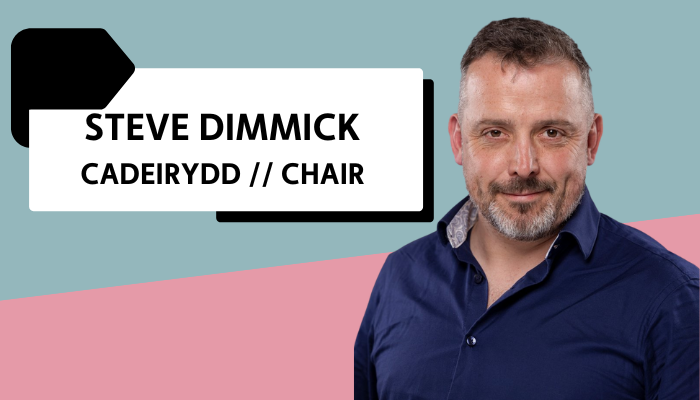Get to know our new Chair – Steve Dimmick

At the latest Management Board meeting, the Trustees unanimously elected Steve Dimmick to succeed Dr Cathryn Charnell-White as Chair of Literature Wales, who has held the role since 2021.
Steve leads a Management Board of 14 Trustees, all ranging from various professional and creative backgrounds, who contribute essential skills and knowledge to shape our activity and strategy.
For further information about Literature Wales’ Board of Trustees, visit: Board of Trustees – Literature Wales
About Steve Dimmick
Steve Dimmick is a Blaina boy. His love of words came from his father, who formed the Poems and Pints community in Blaenau Gwent. Steve runs the CardiffRead book club, the city’s longest running gathering of spine breakers. In this capacity he’s welcomed the likes of Manon Steffan Ros, Chris Power, Owen Sheers, Belinda Bauer, Lemn Sissay and many more through the doors of Canton Library. Day to day, he’s Dad to three children, and sits as a Parent Governor for Ysgol Plasmawr. Steve has also been a Trustee with National Theatre Wales, helping them transition to the Michael-Sheen-led Welsh National Theatre, following the loss of Arts Council of Wales support for NTW.
A lover of languages, Steve was a Welsh Learner of the Year finalist in 2018. As Commercial Director for Awen Cultural Trust, Steve’s remit is to Make People’s Lives Better; something he hopes to achieve as a Trustee with Literature Wales.
We sat down with Steve to find out more about him and his hopes for his time as Chair of Literature Wales.
What does being Chair of Literature Wales mean to you?
Being Chair of Literature Wales means responsibility, accountability and opportunity: – to do the job to the best of my ability, in service to our writers, to hold my hand up when we get it wrong and to help steer the organisation onward. During a transitional period for Cymru and literature itself, marked by a 50% increase in members, our seventh Senedd next year and the growing influence and debate around AI, there will be plenty to consider as we continue our work uncovering, supporting, and championing our writers.
What three words best describe Literature Wales?
Impactful, effective, supportive.
What do you see as the biggest opportunities – or challenges – facing the organisation in the next 12 months?
A year isn’t a long time! I think sending a poet with the FAWs Women’s Team to their first Euros this summer could prove to be the first of many partnerships between our writers and others in showcasing Wales’ literary prowess to the world. In terms of challenges, although we have made significant strides recently in diversifying our revenue streams, there is still much to be done.
I look forward to working with the board and the executive to continue this work, providing resilience to the organisation as we begin defining our strategic vision for 2027-2032.
What qualities do you think are essential in building a strong, effective Board for a modern charity?
I look for curiosity, openness and a collaborative approach. Members should have a genuine passion for the charity and its purpose, be fully aware of their statutory duties and be empathetic. To be truly effective, members must be willing to challenge and be challenged in return, ensuring that diverse opinions receive proper consideration.
Can you share a proud moment when you saw the impact of your charity’s work firsthand?
I am just back from a few days at one of Wales’s national treasures: the Hay Festival. Whilst there, I got to hear from the cohorts of our recent LLIF programme (with our friends at EUNIC) and Writers at Work (in collaboration with Hay itself). Both events showcased writing forged under the pressure of a fortnight together, cheek by jowl, as they improved their craft through the tutelage of guest mentors and coaches. After one of these, I bumped into some Writers at Work alums, participants from almost a decade ago. They were at their annual reunion! Nine years on from the support we provided, they were continuing to support each other, attending each other’s weddings and sporting matching W@W tattoos. In our world of outcomes and outputs, I’m yet to see ‘participants inked themselves with the name of the programme’ as a metric, but maybe it should be!
What is your favourite book or piece of literature, and why?
My Dad’s poems. Dad passed away just before the birth of our first child—August 8th, 2006. After the miners’ strike and pit closures, Dad went from one job to another to make ends meet. Picking up the pen and finding solace in writing was a balm for his soul. I have all his scribblings and the typed-up versions (done by my Mam during her lunch breaks at the office). They reflect so much of Dad’s life: his love for Mam, his awe of nature, his disdain for capitalism, his belief in Wales, his sense of humour, and, of course, his passion for the power of words. I hope, as Chair, I can help many others to write their stories.